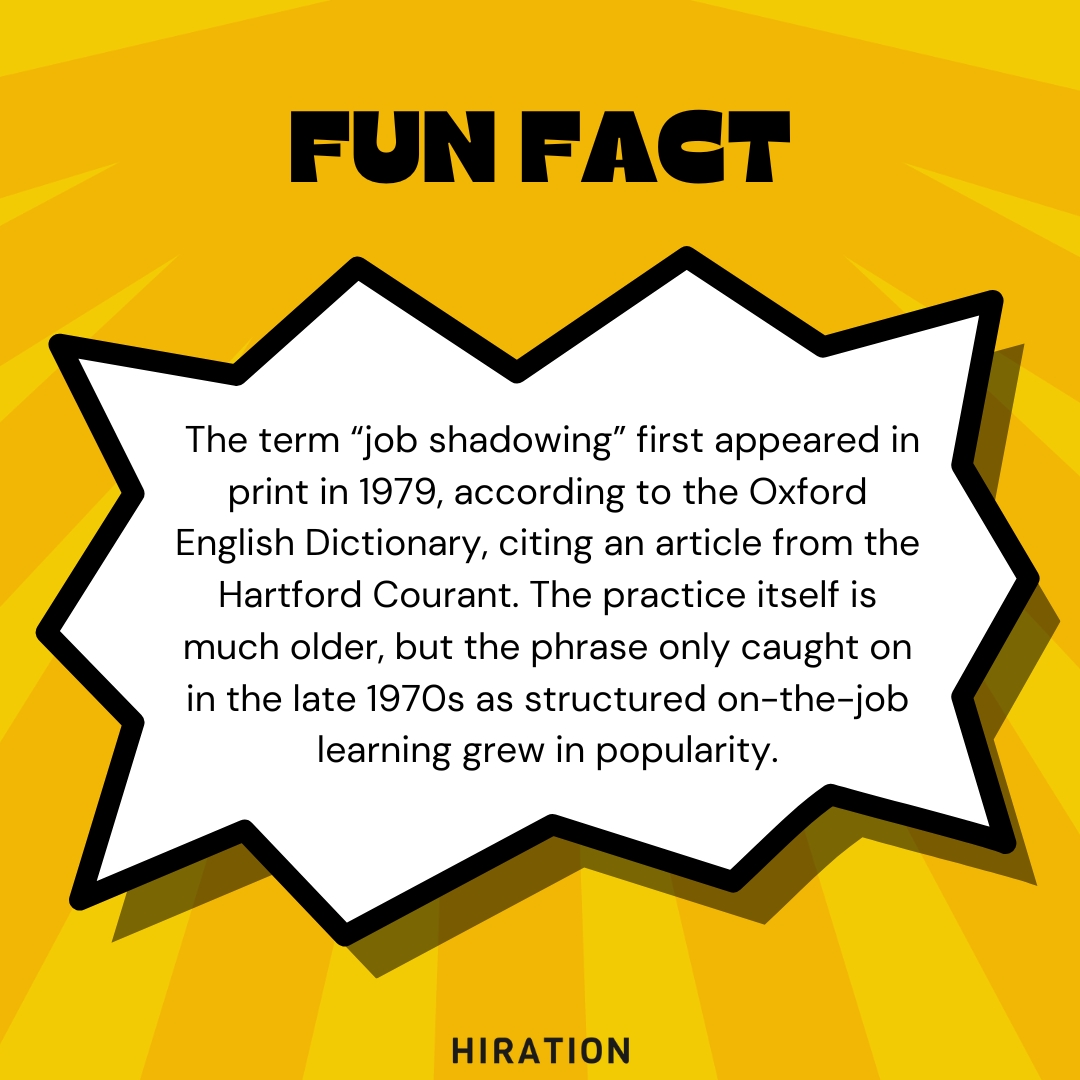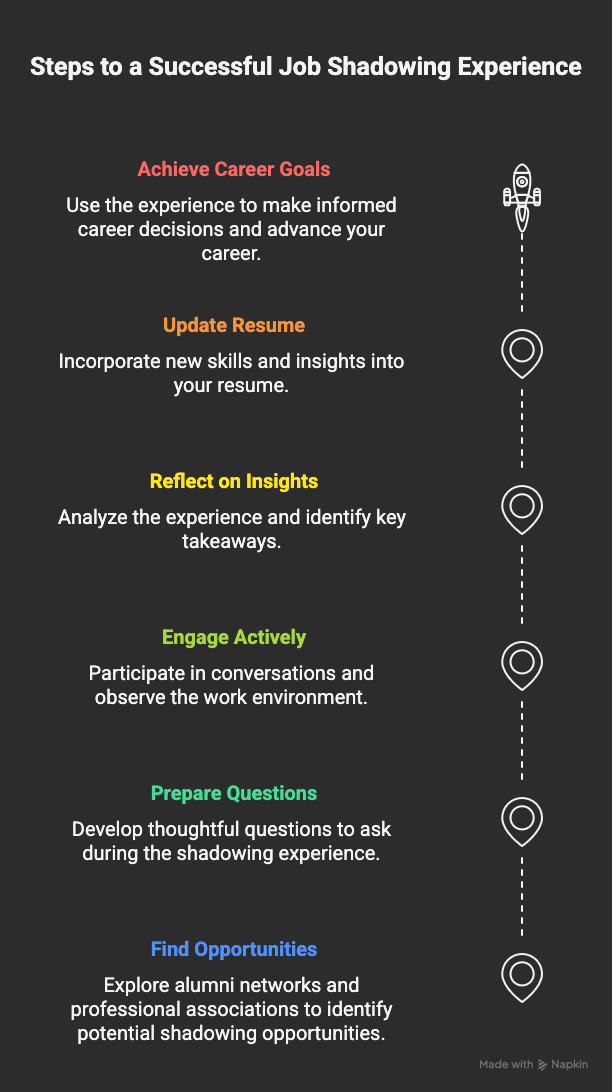Why is job shadowing one of the smartest ways to explore careers?
Job shadowing gives you a firsthand look into a real workday — far beyond what job descriptions reveal. It helps bridge the gap between expectations and reality, improving career clarity and confidence. Studies by the NCDA show that 82% of participants felt more confident about their career choices after shadowing. By observing professionals, asking thoughtful questions, and reflecting on the experience, you gain insight that helps you make informed, low-risk career decisions.
Whether you’re exploring your first career path or considering a professional pivot, job shadowing offers something no job description can - a firsthand look at what work really looks like.
It bridges the gap between assumption and reality, helping you make confident, informed choices about your next step.
In fact, a study by the National Career Development Association (NCDA) found that 82% of participants in job-shadowing programs felt more confident in their career decisions after the experience.
That confidence comes from direct exposure, genuine conversations, and insights that textbooks or job postings, simply can’t provide.
Here’s everything you need to know to find, secure, and make the most of a job shadowing opportunity that actually moves your career forward.
What Exactly is Job Shadowing (& Why Bother)?
Job shadowing is an observational career test-drive. You follow a professional for a day or two to see the unfiltered reality of their job - the good, the bad, and the busy work.
It bridges the gap between what you think a job is and what it actually involves day-to-day.
This clarity is crucial, as it helps you avoid the costly mistake of pursuing a career that doesn't align with your skills, interests, or work-life expectations.
It helps you decide if a career is truly right for you before you commit years and money to it.
Think of it like going beyond a polished job description - a low-risk, high-reward way to gather data on your future.
How Can I Find Job Shadowing Opportunities Near Me?
Go beyond generic online searches by tapping into targeted "warm" networks. Focus on your university's alumni database and the local chapters of professional associations, where people are geographically close and more receptive to mentorship requests.
These two sources are goldmines because they solve the "cold outreach" problem. You aren't just a random person; you're a "fellow alum" or a "fellow association member," which gives you an immediate, shared connection.
Here’s how to use them:
Your University Alumni Database
This is your most powerful "warm" network. Your college's career center or alumni office maintains a database of graduates, searchable by location, company, and job title.
Filter this list for alumni who live in your city and work in your target field. Your opening line is simple and effective: "As a fellow [Your University] graduate, I was hoping you'd be open to..."
This shared bond makes professionals incredibly more likely to help.
Local Chapters of Professional Associations
Don't just join the national association; find and attend a meeting for their local chapter. This puts you in a room (virtual or in-person) with dozens of professionals in your immediate area.
Student memberships are often very cheap. When you meet someone, you can ask for an informational interview, which can then lead to a shadowing request.
Here are a few prominent examples of national bodies that have local chapters:
- Marketing: American Marketing Association (AMA)
- Engineering: Society of Women Engineers (SWE)
- Tech: Association for Computing Machinery (ACM)
- Healthcare: American Nurses Association (ANA)
The "Back-Door" via Volunteering
This is a highly effective, non-obvious strategy. Identify a local non-profit you care about and start volunteering.
You will build genuine, passion-based relationships with other volunteers and board members, who are often established professionals from various local industries.
After building that relationship, it's very natural to ask for career advice or a shadowing day.
Target Small-to-Medium Sized Businesses (SMBs)
Stop focusing only on massive corporations. Their shadowing programs (if they exist) are competitive and formal.
Instead, research interesting SMBs in your area. Find the founder or a department head on LinkedIn.
They are often more accessible and a request to shadow for a day is a much simpler "yes" for them to give.
Your outreach message should be concise and professional, similar to how you'd write a cover letter for an internship, clearly stating your interest in their specific company.

Can I Use LinkedIn to Find Job Shadowing Opportunities?
Yes, but don’t directly ask to "job shadow." That’s a big commitment. Instead, frame your request as a 15-minute informational interview.
People are far more open to sharing advice over a quick coffee (virtual or in-person) than to hosting someone for a full day.
First, make sure your own LinkedIn profile is complete and professional. Then, search for 2nd-degree connections in roles you admire.
Send a personalized connection request asking for a brief chat about their career path. If that conversation goes well, you can then ask if they'd be open to a brief shadow in the future.
What’s the Best Way to “Cold Email” a Professional?
Make your email short, specific, and incredibly easy for them to say "yes" to. The goal is not to ask for a job shadow in the first email. The goal is to get a 15-minute conversation.
You must prove you've done your research and are not just spamming a template.
Never send a generic mass email. A successful outreach message is professional and demonstrates genuine interest in that specific person.
Here is a customizable template that works:
Subject: Impressed by your [Specific Project/Article] - quick advice?
Body:
Hi [Professional's Name],
My name is [Your Name], and I'm a [Your Year, Your Major] at [Your University]. I've been following your work and was so impressed by the recent [Name of project, article, or talk] you did on [Topic]. Your point about [1-sentence specific observation] really stuck with me.
As I'm preparing for a career in [Their Field], I'm trying to learn from leaders like you who have successfully [Mention a specific part of their path, e.g., "transitioned from finance to data science" or "led a major product launch"].
I know you're incredibly busy, but would you be open to a 15-minute call in the coming weeks? I'd be grateful to ask you two quick questions about your experience.
If a call is too much, I'd be just as grateful to email my questions over.
Thank you for your time and consideration.
Best,
[Your Name]
[Link to your LinkedIn Profile]
Why this email is effective:
- It's Specific: It immediately proves you've done your homework ("Impressed by your [Specific Project]"). This separates you from 99% of other emails.
- It Connects to Them: It shows why you're emailing them specifically ("leaders like you who have successfully...").
- It’s a Small, Clear Ask: "15-minute call" is a small, low-friction request.
- It Provides an "Easy Out": The line, "If a call is too much, I'd be just as grateful to email my questions," is a power move. It respects their time and makes them more likely to respond, often by saying, "A call is fine, how about...?"
How Do I Make the Most of the Day?
Prepare, engage, and follow up. Go in with thoughtful questions you can't Google. Observe the company culture, not just the job tasks. And always, always send a thank-you note within 24 hours.
Your goal is to understand the "day-to-day" reality. Ask questions like:
- "What is the most challenging part of your job that people don't see?"
- "What does the unwritten company culture value most?"
- "What skills do you see as most critical for this role in the next five years?"
Afterward, take time to reflect on what you observed.
Identify the technical and soft skills that stood out and consider how they align with your own strengths or areas for growth.
Then, update your resume or development plan to reflect these insights - turning a single day of observation into actionable progress for your career.

Wrapping Up
Job shadowing isn’t just about observing - it’s about gaining clarity and confidence in your next step.
The insights you gather from even a single day can shape smarter career choices, stronger resumes, and more meaningful professional goals.
If you’re ready to turn those insights into action, Hiration can help you take the next leap.
From building optimized resumes and cover letters to preparing for interviews, and polishing your LinkedIn profile, Hiration’s AI-powered platform make it easier to showcase what you’ve learned and move closer to the career you want.
Job Shadowing — FAQ
What is job shadowing?
Job shadowing is a short-term observational experience where you follow a professional during their workday to understand the realities of their role, workplace culture, and career demands.
Why is job shadowing important for career decisions?
It helps you verify if a career aligns with your interests and values before committing years to training or education. You gain clarity, avoid costly missteps, and make data-driven career decisions through firsthand exposure.
How can I find job shadowing opportunities near me?
Start with your university’s alumni network and local chapters of professional associations. These are “warm” networks where people are more open to mentorship and short shadowing requests.
Can I use LinkedIn to find job shadowing opportunities?
Yes. Start with informational interviews rather than direct shadowing requests. Build rapport through 15-minute chats about their career, and if the conversation goes well, ask about shadowing later.
What’s the best way to ask for a job shadowing opportunity?
Send a concise, personalized email that highlights why you’re reaching out, what you admire about their work, and politely ask for a 15-minute conversation first. Respect their time and offer flexibility — this increases your chances of a response.
How should I prepare for the shadowing day?
Research the organization and role beforehand. Prepare thoughtful questions, observe workplace interactions, and note skills or qualities that stand out. Always follow up with a thank-you note within 24 hours.
Can volunteering lead to job shadowing opportunities?
Yes. Volunteering helps you build authentic relationships with professionals and board members who may later invite you to shadow or discuss career paths informally.
How can Hiration help me act on insights from job shadowing?
Hiration helps you translate your shadowing experience into results — from crafting targeted resumes and cover letters to optimizing your LinkedIn profile and practicing interviews. Its AI-powered tools make career transitions smoother and more strategic.



